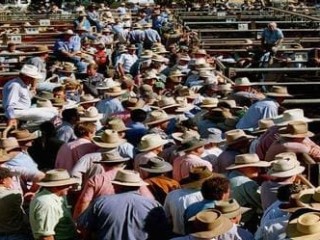 The Gunnedah Regional Saleyards is set to expand its catchment area into northern NSW and Southern Queensland after the NSW Government announced funding to open the Kamilaroi Highway to road trains last week.
The Gunnedah Regional Saleyards is set to expand its catchment area into northern NSW and Southern Queensland after the NSW Government announced funding to open the Kamilaroi Highway to road trains last week.
NSW minister for roads and ports Duncan Gay said the Government will spend $400,000 on safety upgrades to the 90 kilometre stretch of highway from Narrabri to the Gunnedah Saleyards.
The work, which will include the installation of wire rope safety barriers and improved road access to the saleyards, is expected to be completed by early April next year.
Once completed, A-Double road trains fitted with tri-axle dollies will be given access to the 90km route for a period of three years.
B-Triples and AB-triples up to 36.5 metres in overall length will be also allowed under permit to operate on the route under the current NSW Road Train Modernisation Program.
“This reform will allow A-double road trains fitted with road-friendly suspended tri-axle dollies and B-Triple and AB-Triple trucks to service the saleyards resulting in a more efficient road freight outcome for northwest NSW,” Mr Gay said.
“A safe and sensible way to increase freight efficiency is to provide greater access to more modern and productive freight trucks, in the process reducing the number of vehicle movements on our roads.”
“Significantly, the tri-axle dolly on these modern road trains will be permitted to operate at 20 tonnes for General Mass Limits (GML) and 21 tonnes for Concessional Mass Limits (CML).”
The tri-axle dolly approach means that road trains equipped with a tandem axle dolly would be prohibited from using the route.
Mr Gay said research by the National Transport Commission indicated that fitting a road-friendly suspended tri-axle dolly to an A-double road train improved the stability and tracking of the vehicle compared to the use of a traditional tandem axle dolly.
He said the reform represented an opportunity for industry to transition to more modern and safer truck configurations.
The Gunnedah Shire Council recently announced $850,000 in funding to improve and expand the saleyards, including the construction of 60 new selling and holding pens.
Gunnedah was the second largest cattle selling centre in NSW in 2010-11 according to Meat and Livestock Australia, drawing almost 133,000 head of cattle worth more than $100m from as far as Bourke and Central Queensland.
Dubbo, with an annual throughput in excess of 200,000 cattle, holds the title of NSW’s largest cattle selling centre. Gunnedah, Wagga and the CTLX at Carcoar typically jockey for the position of second largest from year to year.
However, the expanded catchment zone opened by the highway upgrade is expected to boost Gunnedah’s annual throughput, which could help the centre to tighten its grip on the No.2 position.
The more efficient transport into Gunnedah would enable the centre to compete for more cattle from Southern Queensland against Roma and from northern NSW against Dubbo, saleyards manager Bruce ‘Doc’ Morrison said.
"It is just going to open up more areas for us,” he told Beef Central. “You have got road trains into Roma, road trains into Dubbo, so until we opened that up our areas of growth weren’t going to be there.”
He said that while it would take time for the highway upgrade to translate into expanded throughput, as local agents worked to build relationships with cattle suppliers in norhtern areas, an immediate benefit would occur through greater competition from northern buyers for cattle sold at Gunnedah.
“Cattle going out will be an immediate result, there are a fair few going through to Queensland now,” Mr Morrison said.
“With this flat back move they have got up there, with people going further into the British and Euro breeds, having this road train access opens southern markets up to them a bit more.”
Mr Gay said that livestock operators wanting to access the route would need to be qualified under the National Heavy Vehicle Accreditation Scheme (NHVAS) Maintenance Management Module which ensures operators have good vehicle maintenance systems in place.
